Lukashenko urges great calf care, sees cow as sacred animal
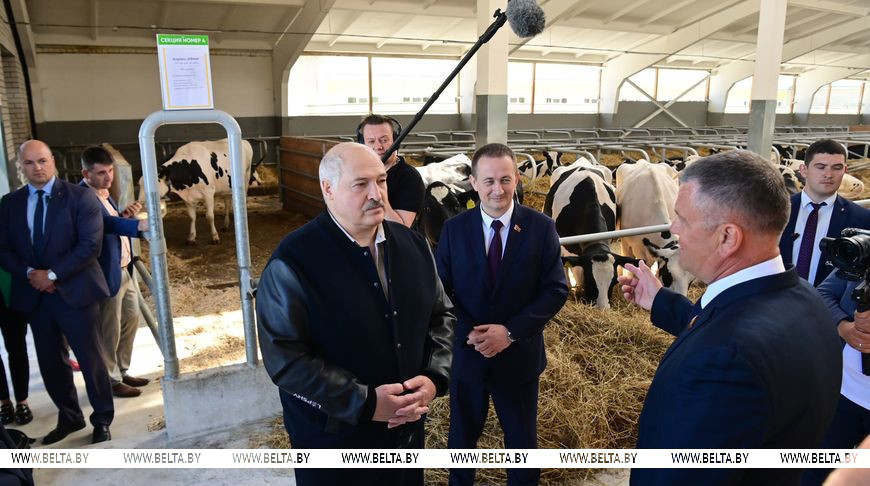
The footage from the holding company Kupalovskoye went viral in the spring of 2019. More than 30 million people watched the video on BelTA’s YouTube channel alone. The farm had no production discipline, no proper hygiene. That’s how the president saw this agricultural holding. Serious personnel reshuffles followed, and a number of officials lost their positions. A lot of attention is paid to the livestock welfare in Belarus. After all, the performance of the dairy industry largely depends on it. In this episode of BelTA’s YouTube project “After the Fact: Lukashenko’s Decisions” we will tell you what the four requirements in cattle breeding are. Where in Belarus are red pedigree cattle grown? What are the president’s calf breeding tips?
What are Belarus’ milk output forecast for 2024
Milk output in Belarus increases every year. In 2024, the output is expected to exceed 8.5 million tonnes, up by 5% over last year.
Last year we had about 5,800kg of milk per cow. This year we expect more than 6,100kg of milk per cow. The records are kept. How do we manage to ramp up the output? First of all, thanks to the construction and reconstruction of farms and the active use of modern technologies, as instructed by the head of state. These measures bear fruit,” Ivan Tsarik, Deputy Head of the Directorate of Livestock Breeding and Fishery at the Agriculture and Food Ministry of Belarus

Now there are 1,600 modern high-tech complexes in Belarus. The president instructed to get all the dairy farms switched to modern technologies by 2030.
“We need to build and reconstruct about 600 dairy farms. At present the regional authorities are drawing up a list of such facilities. From 80 to 90 facilities will be built,” said Sergei Golikov, Deputy Head of the Directorate of Investment, Construction and Land Reclamation at the Agriculture and Food Ministry of Belarus.
What are the four requirements in the dairy industry?
Practice shows: in the new farm the cow gives 5kg more milk though fodder diet remains the same.

“There are examples. Yesterday this cow produced 18kg. Today the same cow produces 23kg. 5kg more! The same animal, fodder, people… But once you create comfortable conditions for the animal, it performs better immediately. We have the so-called four requirements in milk production: cows, personnel, fodder and comfort. Once these requirements are in place and work together, you get the maximum result,” Ivan Tsarik believes.

It should be noted that not so long ago few people cared about the fourth requirement, namely comfort. Now things have changed. Scientists and specialists understand the economic effect of such an approach.
In June 2024, the president inspected the Lyakhovichi dairy complex. There he talked to the personnel. Aleksandr Lukashenko asked one of the milkmaids about the largest milk yield and shared a stor from his life. “I have 11 cows at home. I had a cow that produced 45 liters a day, 4.5 buckets. But she would not get inseminated artificially. I gave it to a farmer! She’s already had two heifers,” the president said.
Why does Lukashenko call farming one of the best jobs?
During the trip to Dzerzhinsk District Aleksandr Lukashenko noted that the Lyakhovichi dairy complex was the most cost-effective farm in the country and that experience should be scaled up throughout Belarus.
“At this complex, everything is thought out to the detail. The second stage of construction is nearing completion now. By the end of the year we are to commission a dry-stock and milking shop. The most important thing is the economic feasibility. During the construction of this complex, everything was calculated to the tiniest detail in order to get the best technologies for the financial resources that we had,” said Yuri Klimash, Director of Krutogorye-Petkovichi.
This is a no-frills complex. Many works were done by the company on its own. The complex runs the entire technological cycle, from raising a calf to milk production.

During his visit to the dairy complex, Aleksandr Lukashenko once again said that work in agriculture is one of the most interesting.
“There’s no better job, remember. I’ve been through it all. I dream at night about the people I’ve worked with. I dream of cattle, cows. Even of milking them, imagine that! None of that presidency stuff. This is the most interesting job. Living people, living cattle, planting living plants, and seeing the results every year!”
“It should feel like going to work, you should be living and breathing it!” Yuri Klimash agreed.
“That’s right,” the president responded.
Why does the Lyakhovichi dairy complex stand out?
Now the dairy herd exceeds a thousand head. On average, each cow gives 23 liters of milk per day. The record holder cow gives 48 liters.
“Cows have more freedom, they are more comfortable. Processes are automated. We shut down farms where cows gave 17 to 18 liters per head. Now they give 23, 24 liters. It is clear that here milking is more comfortable for a cow and feeding is easier for us,” said Yevgeny Lebedko, chief livestock specialist. The animals get silage, haylage, cake, crushed corn and more. The diet varies depending on test results: cows undergo regular check-ups.
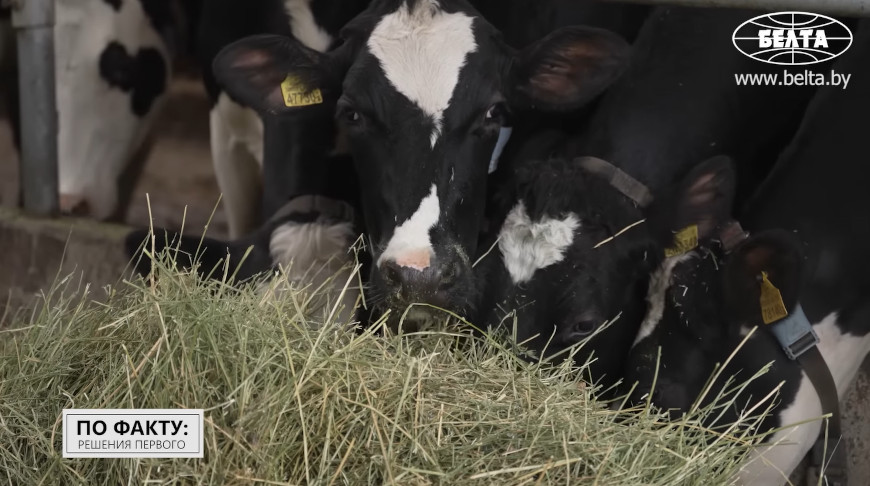
“We are provided with at least a year and a half of feed. This complex and other facilities throughout the farm have no problems with feed whatsoever. If we talk numbers, we have more than 60,000 tonnes of high-quality corn silage, 34,000 tonnes of haylage, almost 6,000 tonnes of hay. We have everything to feed the livestock of our farm, and this is almost 11,000 cattle and 21,500 pigs. We received the largest harvest of grain ever. This is 26,000 tonnes of grain, plus 9,000 tonnes of corn grain, 3,000 tonnes of rapeseed,” Yuri Klimash said.
Any equipment, even the most advanced, needs humans to operate it. Highly qualified and well-trained operators are needed for such work. The lack of human resources has always been a problem in agriculture. Now people are attracted by substantial perks and benefits.
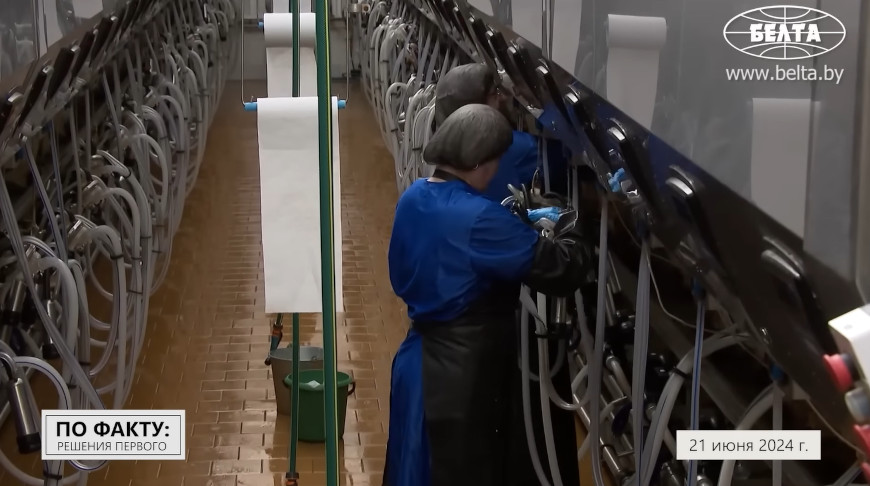
“Today, a machine milking operator or a driver who operates a tractor with an automatic steering wheel, GPS navigation, must have certain training. Today, the farm is fully staffed with managerial personnel and mid-level specialists. We sponsor the study of four people now. In line with the contract, they will work for us for at least 5 years after finishing their study. This year we hired 17 graduates of various educational institutions in line with the first job mandatory placement program. Last year we hired 22 people as part of this program,” Yuri Klimash said.

How should calves be taken care of?
Calf management is another story. They need a healthy environment to grow. Technological regulations for milk production, including maintenance of calves, have been developed. Scientists and specialists from the country’s leading farms worked on the document.

“As soon as a cow has calved, we take a calf under a lamp, dry it, feed it with colostrum in the first hour of life. And then we put it in an individual hut, where it stays for about three months. It is plastic for now. But we are building a roofed sanatorium for 400 cattle. Other complexes already have such sanatoriums,” Yevgeny Lebedko said. Calves are kept under a roof, for example, at the Turok farm in Petrikov District, which was re-opened after renovations in 2010. Aleksandr Lukashenko visited it and familiarized himself with the technological process of raising young cattle.
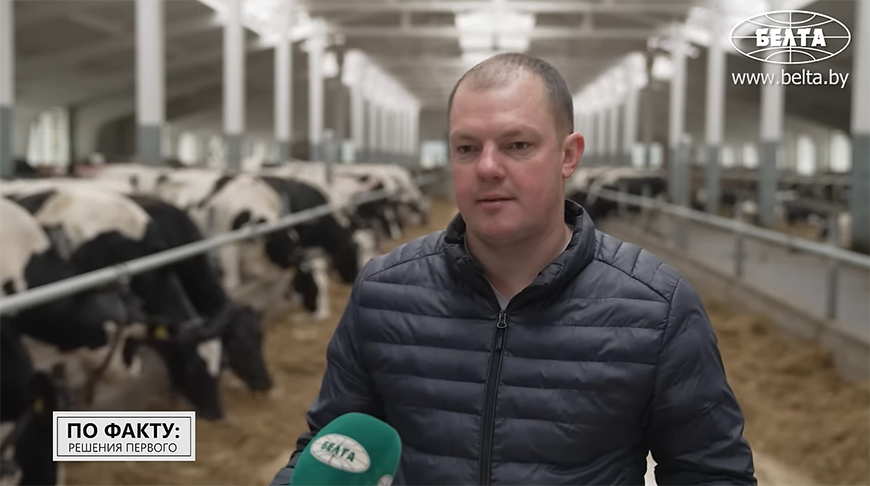
“This is the best option. Calves need to be kept under a roof. All these cages are nonsense. Especially those polyethylene ones. I tried it on my farm: when it’s hot, the calf is all sweaty and wet – it will definitely get sick. We’re used to palaces. But animals don’t need palaces. The simpler the better for them. Everything is neatly done,” Aleksandr Lukashenko said. “We should set a task: each complex should have such a camp for three-week-old cattle.”
It is important to comply with the requirements in order to avoid diseases of calves and, as a consequence, animal mortality. Loss of cattle cases are often identified and taken to court.
When visiting the cattle fattening and keeping complex in Berestovitsa District in August 2023, Aleksandr Lukashenko demanded to eradicate the facts of cattle mortality in farms, and to transfer calves from negligent organizations to places where they will get proper care.
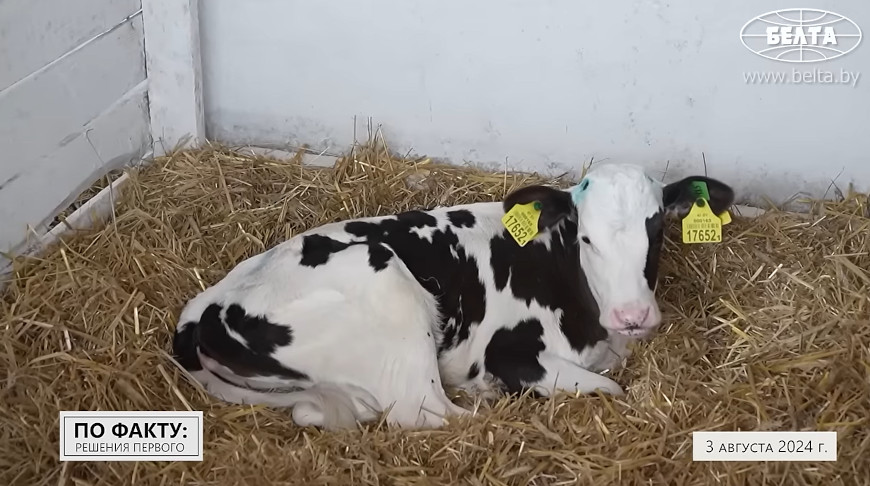
“There should be no livestock mortality. Only in exceptional circumstances. It is necessary to take them away. Until they [negligent farms] work out appropriate technologies. A newborn calf should be treated as a newborn child,” said the head of state. “Why don’t we bring him cattle from negligent farms? He would not refuse. Those who do not know how to keep calves up to a month old should give them to those who know what to do.”
What cattle breeds are there in Belarus?
In Belarus, the dairy herd is about 1,370,000 head. Mostly, they are white and black cattle. There are also experimental cattle.
“Holstein is the main breed. Belarusian scientists tested and registered domestic breed of dairy cattle in 2020. The National Academy of Sciences has also imported red cattle in order to test, develop, multiply and use it in milk production,” Ivan Tsarik said.
Specialists are studying how to feed, treat and keep such cattle. We already have complexes for raising such cows. One of them is the Ustensky dairy farm in Orsha District which the head of state visited in October 2021. At the enterprise, the president was invited to taste products made from the milk of red Danish cows: yogurt milk and sourdough.
Just over a hundred modern dairy complexes will be commissioned by the end of this year. The cattle are kept in good conditions and give more milk. This is the food security of the country. In fact, the quality of food on our tables depends on how cows are kept.
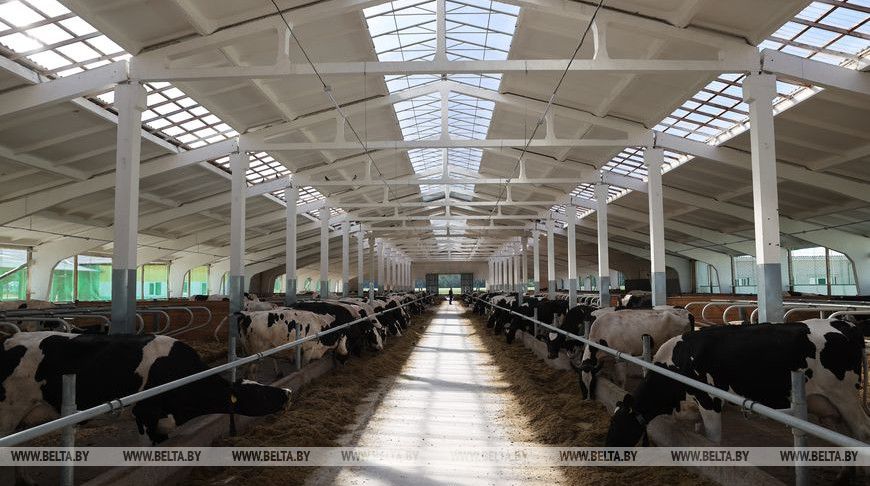
“We need a monument to a cow. Partisans and children survived thanks to a cow during the war. After the war, we survived thanks to a cow. A cow still feeds us. A cow is sacred. For me, it is sacred!” the Belarusian leader said during his visit to the Parokhonskoye enterprise in Pinsk District in October 2024.